Orchestra Wives

Brief Synopsis
Cast & Crew
Archie Mayo
George Montgomery
Ann Rutherford
Glenn Miller
Lynn Bari
Carole Landis
Film Details
Technical Specs

Synopsis
The musicians of Gene Morrison's popular swing band are dismayed to learn that they are about to go on tour, as the rigors of their last tour almost destroyed several marriages. The only unconcerned members are trumpet player Bill Abbott, who believes that marriage is for fools, and his womanizing friend, pianist St. John "Sinjin" Smith. Meanwhile, small-town girl Connie Ward accepts the invitation of soda clerk Cully Anderson to see Gene's band. Connie is thrilled by the concert, especially when she meets Bill, who is her idol. Bill is moved by Connie's beauty and naïveté, and is excited to steal a kiss from her. He invites her to see him the next night in another town, and Connie's understanding father, Dr. Ward, allows her to go. As Connie cannot enter the dance hall without an escort, she waits outside until the show is over. Bill finds her, and the pair, suddenly finding themselves in love and unable to part, marry that night. The next day, Connie and Bill join the band on a train bound for the next tour stop. Some of the other "orchestra wives," Natalie Mercer, Caroline Steele and Elsie, are bored with the constant travel and look upon the innocent Connie as a welcome distraction. They also are curious about how band singer Jaynie Stevens, who had been Bill's girl friend, will react to his marriage. As five weeks pass, Bill and Connie's love grows, but Connie becomes unsettled by the blur of hotel rooms and different towns. She also tires of the other wives, who have nothing better to do than flirt with one another's husbands and tell tales about it. One evening, the wives remain in Des Moines while the band plays in nearby Iowa City, and Natalie reveals to Connie that Bill and Jaynie used to be romantically involved. Distraught, Connie takes a bus to Iowa City, but before she arrives, Natalie calls Jaynie and tells her that the young bride is coming. Jaynie arranges for Bill to be in her hotel room when Connie arrives, and Connie assumes the worst despite Bill's protestations. The next day, Connie pleads with Bill to forget what happened, but he is still angry that she checked up on him. When Connie learns that Natalie set her up, she angrily repeats the gossip about Natalie and Caroline flirting with each other's husbands, Phil and Buddy. Natalie and Caroline then force their husbands to quit the band, and Bill quits also when Gene orders him to keep Connie quiet. After another fight, Bill and Connie decide to end their marriage, and Connie returns to her home town. She is miserable without Bill, however, and with Sinjin's help, decides to reunite the band. She and Sinjin send out telegrams telling the members to meet, and bring about a reconciliation between Natalie and Caroline. The band members agree to open a new casino, which Connie attends with her father. When Gene tells Bill to steer clear of Connie, Sinjin reveals her part in the band's reunion, and a grateful Bill demands that Connie return to him. Connie enjoys the show, then kisses her husband as she dances with him.

Cast

George Montgomery

Ann Rutherford
Glenn Miller
Lynn Bari

Carole Landis
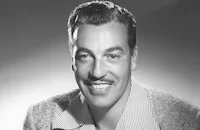
Cesar Romero

Virginia Gilmore
Mary Beth Hughes
Nicholas Brothers

Tamara Geva
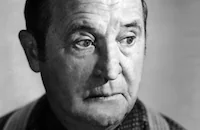
Frank Orth
Tex Beneke
Moe Purtill
Ray Eberle
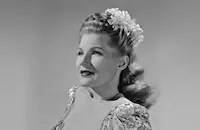
Marion Hutton
The Modernaires
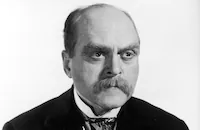
Grant Mitchell

Henry Morgan

Jackie Gleason
Edith Evanson
Alec Craig
Kay Linaker
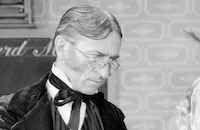
Olin Howlin
Arthur Loft
William Newell
Tom Dugan

Iris Adrian
George Durgom
Trudy Marshall

Dale Evans
Jane Goude
Henry Roquemore
Dick Rush
Nick Cochrane
Dick Winslow
Lillian Porter
Robert Emmett Keane
Bill Cartledge
Kenneth Howell

Dick Hogan
Crew
Lucien Ballard
Robert Bischoff
Harry Brand
Bernard Carr
Nick Castle
Richard Day
Pat Friday
William Goetz
Don Goldberg
Mack Gordon
Roger Heman
William Koenig
Fred Lau
William Lebaron
Steve Lipkin
Thomas Little
Earl Luick
Chummy Macgregor
William May
F. W. Meacham
Billy Meyers
Glenn Miller
Alfred Newman
Guy Pearce
Jack Pettis
James Prindle
Elmer Schoebel
Karl Tunberg
Darrell Ware
Harry Warren
Joseph C. Wright

Film Details
Technical Specs

Award Nominations
Best Song
Articles
Orchestra Wives (1942) - Orchestra Wives
In early 1942, Billboard magazine named Glenn Miller the top recording artist for the third year in a row, and that spring, the band headed to Hollywood to appear in their second Fox film, Orchestra Wives. This time, the band was not only a part of the story, it was essential to it. The film shows the excitement and tedium of a band's life on the road: the adoring crowds, the one-night stands, train rides, hotels, late-night Chinese dinners, and the wives who are part of the caravan. Small-town girl Connie Ward (Ann Rutherford) is a fan of the Gene Morrison (Glenn Miller) band, especially trumpet player Bill Abbott (George Montgomery). When the band comes to town, she meets and falls instantly in love with Abbott, and impulsively marries him. But joining the sorority of bitchy, gossipy orchestra wives and encountering her husband's former girlfriend, the band's singer (Lynn Bari), puts a strain on the marriage.
Along the way, the band introduces several songs by Mack Gordon and Harry Warren that became Miller standards: "Serenade in Blue," "People Like You and Me," and the ballad "At Last," which had been written for and cut from Sun Valley Serenade. The breathtaking finale is the swingy "I've Got a Gal in Kalamazoo," which was nominated for an Academy Award© for Best Song (it lost to Irving Berlin's "White Christmas," from Holiday Inn), and features the spectacular dancing of the Nicholas Brothers. There were also snatches of other Miller hits, such as "Moonlight Serenade," which plays over the opening credits, and "American Patrol." Pat Friday, who had dubbed Lynn Bari's vocals in Sun Valley Serenade, again provided Bari's singing voice. Miller trumpeter Steve Lipkin dubbed the trumpet for Montgomery (some sources say it was Johnny Best, Bobby Hackett or Billy May), Chummy McGregor played piano for Cesar Romero, and bassist Doc Goldberg pounded the bass for Jackie Gleason. Among Miller band members who also played speaking roles in Orchestra Wives were sax player and singer Tex Beneke and drummer Moe Purtill, who played orchestra husbands Phil and Buddy. Singers Ray Eberle and Marion Hutton (the lookalike sister of actress Betty Hutton) also had a few lines in the film.
The short, balding band equipment manager was played in the film by George "Bullets" Durgom, who had once been Miller's real-life "band boy," and had a knack for spotting talent. He later became the personal manager for several celebrities, including Frank Sinatra and Jackie Gleason, who is unbilled as the bass player of the band. Gleason had been a vaudeville and nightclub comic before going to Hollywood with a contract at Warner Brothers. His film career never took off, and it was Bullets Durgom who suggested that he should go into television. Other unbilled future television stars had small roles in Orchestra Wives: Dale Evans, who made her film debut as one of Connie's soda shop friends, and Harry Morgan, who played the soda jerk who takes Connie to the fateful concert where she meets Bill.
Fox's marketing for Orchestra Wives was targeted toward Miller fans, and heavy on the jive talk. The Miller Orchestra went on a nationwide summer tour, playing the songs from the movie. By the time the film opened in September of 1942, Miller's recording of "I've Got a Gal in Kalamazoo" was already at a top hit. A month later, both "Serenade in Blue" and "At Last" joined it on the charts. Reviews credited the music for the film's success: "Glenn Miller and his orchestra give this musical all they've got, and that's a lot, in the opinion of just about everybody who goes for swing music, and if that isn't everybody it's a reasonable facsimile, according to radio polls, juke box ballots and record sales," wrote the Motion Picture Herald critic. Variety raved, "This is the best picture yet made about a band organization. Hot music and sexy intrigue are coupled in a major piece of adult entertainment which will roll up exceptional grosses. Into its rhythms and exhilarating tempo is fitted a dangerously gossipy yet constantly humorous narrative reminiscent of the play The Women." Even negative reviews, like Bosley Crowther's in the New York Times, took note of the film's appeal: "Hepcats and other such fauna who are 'sent' by Glenn Miller's honeyed swing will be the most likely recipients of Twentieth Century-Fox's Orchestra Wives, which was wafted into the Roxy on wings of song and little else yesterday. For once more the Hollywood tailors have draped the shivering shoulders of a popular band with a trifling little story which is as ridiculous as a zoot suit and has no more shape or distinction than one of those forbidden garbs."
In spite of Orchestra Wives' box office success, it was Glenn Miller's last film appearance. The U.S. was at war, and Miller joined the Army Air Corp's Special Services, organizing a band of military musicians to entertain the troops. In December of 1944, his plane headed from England to France disappeared over the English Channel. Neither the plane nor Miller's body was ever recovered. Fortunately, the two films in which the Glenn Miller Orchestra appears provide a vivid record of the band's enormous appeal.
Producer: William LeBaron
Director: Archie Mayo, John Brahm (uncredited)
Screenplay: Karl Tunberg, Darrell Ware, story by James Prindle
Cinematography: Lucien Ballard
Editor: Robert Bischoff
Costume Design: Earl Luick
Art Direction: Richard Day, Joseph C. Wright
Music: Songs by Mack Gordon and Harry Warren
Cast: George Montgomery (Bill Abbott), Ann Rutherford (Connie Ward Abbott), Glenn Miller (Gene Morrison), Lynn Bari, (Jaynie Stevens), Carole Landis (Natalie Mercer), Cesar Romero (St. John "Sinjin" Smith), Virginia Gilmore (Elsie), Mary Beth Hughes (Caroline Steele), Nicholas Brothers (Specialty Dancers), Tamara Geva (Mrs. Beck), Frank Orth (Rex Willet), Tex Beneke (Phil Mercer), Moe Purtill (Buddy Steele), Jackie Gleason (Ben Beck), Henry ("Harry") Morgan (Cully Anderson), Dale Evans (Hazel).
BW-97m.
by Margarita Landazuri

Orchestra Wives (1942) - Orchestra Wives
Fayard Nicholas (1914-2006)
Born on October 20, 1914 in Mobile, Alabama, Fayard was the son of musicians who played in vaudeville pit orchestras. When he was 6 1/2 years of age, his younger brother Harold was born (March 27, 1921, Winston-Salem, North Carolina) and little did they realize that they were destined to be one of the most memorable dance duos in film history.
Fayard learned to dance by watching several vaudeville shows while traveling with his parents. He incorporated many of the acrobatic moves he saw into his own routines, and soon, Harold was learning with him. By 1932, they had auditioned, and landed, a spot in Harlem's celebrated haunt, The Cotton Club. Their routines were a sensation, and Samuel Goldwyn brought them to Hollywood where they performed in Kid Millions (1934) with Eddie Cantor and The Big Broadcast of 1936 (1937). That same year, they appeared on Broadway The Ziegfeld Follies of 1936 and Babes in Arms.
Fayard and Harold headed back to The Cotton Club to polish up their moves, and when they came back to Hollywood in the '40s, they entered their golded period. In Down Argentina Way (1940) starring Don Ameche and Betty Grable, they did that extraordinary number, leaping off a grand piano and doing eye-popping splits over each other on an oversized staircase; Sun Valley Serenade (1941), they have an engaging Chattenooga Choo-Choo routine with a 19-year-old Dorothy Dandridge; and best of all, The Pirate (1948) where they do a terrific Be a Clown routine with Gene Kelly that's every bit as comical as it was inventive.
In the early '50s, the brothers were touring all over the United States and Europe, but in 1957, Harold spent seven years in Paris and only reunited with Fayard in a 1964 television appearance on the hit variety show The Hollywood Palace. But as their performance teaming became less frequent as they got older, Fayard found ways to keep busy. He drew critical praise for his dramatic turn in The Liberation of L.B. Jones (1970) and won a Tony for his choreography for Black and Blue (1989). In 1991, Both Fayard and Harold received the Kennedy Center Honors and most deserved honory Oscars® at the Academy Awards. Nicholas is survived by his wife, Katherine; sister, Dorothy; sons, Tony and Paul; four grandchildren; and a great-granddaughter.
by Michael T. Toole
Fayard Nicholas (1914-2006)
Orchestra Wives on DVD
During one of the band's breaks, while Cully is making a gentlemanly visit to the concession stand to buy his date a Coca-Cola, Connie and Bill meet, and before you can say 'would like some ice in that?' she's engaging in some not-so-innocent necking in Cully's car-though the Production Code would keep them in the front seat, chastely separated by the stick shift. At Bill's invitation Connie returns the next night to see the band, and he's barely caught sight of her before he has popped the question, and the pair instantly elope. Never having been away from home before, Connie is thrilled at the prospect of joining the band on their cross-country tour, traveling by train from town to town and staying in hotels. Though the reality of life on the road proves to be nowhere near as glamorous as Connie had imaged, the starry-eyed young bride cheerfully suffers the inconveniences to be with her adoring husband.
News of the marriage comes as a shock to the company, particularly to band vocalist Jaynie Stevens (Lynn Bari), with whom Bill had a fling in the recent past. As Connie tries to settle into the hard life on the road, Jaynie sets her sights on breaking up the inconceivably happy couple, with the assistance of her fellow band widows Natalie (Carole Landis), Caroline (Mary Beth Hughes), and Elsie (Virginia Gilmore), three sharp clawed cats who spend their idle hours while their husbands are working trading gossip about each other. Jaynie's plan is to befriend her rival, reasoning that "you have to be close to stab somebody."
Jaynie finally gets her chance to throw a monkey wrench into the marriage when the band is playing a one night side-trip to which the wives are not invited. She sets a frame-up in which Connie will find Bill in her room in a compromising position, and the guileless young bride falls for it. Unfortunately, the plan goes awry when Connie's revenge threatens to break up the entire band for good. When Connie finally learns the truth, she plots to get everyone back together, with the help of pal St. John 'Sinjin' Smith (Cesar Romero), the band's pianist.
Over fifty years after its release, Orchestra Wives seems a hilariously naive story: a harmless tale of love at first sight that doesn't provide enough depth to the characters to explain their attraction to each other. The screenplay (by Karl Tunberg and Darrell Ware) is so workmanlike that even the least-seasoned first-time viewer will know where the film is going long before it gets there. The performances can't be faulted: Ann Rutherford is achingly sincere as the blushing bride: so good, in fact, that she easily smoothes over the film's rough spots. Western star George Montgomery seems totally at ease in the lightweight material, though there's a bit of sagebrush in his reaction to news that his wife has caused the breakup of the band. And Glenn Miller gives a thoroughly natural performance-something far more difficult than it seems-as the band leader. The cast includes a very young (and much thinner) Jackie Gleason as the band's bass player.
But the real star of the film is Glenn Miller's band: the film features on-screen performances of some of Miller's greatest hits, including "Chattanooga Choo-Choo," "Serenade in Blue," "People Like You and Me," and "At Last." The film is capped by a fabulous finale: a production of "I've Got a Gal in Kalamazoo" that features a special appearance by The Nicholas Brothers.
Fox's new DVD was struck from source material that is in good condition despite some debris and noticeable grain. The audio shows signs of some mild deterioration, noticeable in some of the score's crescendos, but fortunately the Miller numbers are clean and clear, with full-bodied tone quality. The disc includes a feature length commentary with Fayard Nicholas of the Nicholas Brothers, and star Ann Rutherford.
For more information about Orchestra Wives, visit Fox Home Entertainment. To order Orchestra Wives, go to TCM Shopping.
by Fred Hunter
Orchestra Wives on DVD
Quotes
Now listen cutie-pie. I'm a big, bad trumpet player, and never in my life have I seen anything so gorgeous coming off a dance floor. I've seen thousands. I've kissed some of them, but not like I'm going to kiss you.- Bill Abbott
Trivia
Lynn Bari's singing was dubbed by Pat Friday.
Notes
The working title of this film was Orchestra Wife. A February 19, 1942 Los Angeles Examiner news item reported that Gregory Ratoff had been set to direct the picture, although Hollywood Reporter announced the next day that John Brahm would be the director. According to Hollywood Reporter news items, John Brahm began direction of the picture but was replaced by Archie Mayo on April 21, 1942. A studio press release noted that Brahm was replaced due to illness. Other Hollywood Reporter news items noted that first Maureen O'Hara and then Linda Darnell had been cast in the picture. Contracts in the Twentieth Century-Fox Records of the Legal Department, located at the UCLA Arts-Special Collections Library, disclose that Harry Davenport was originally signed to play "Dr. Ward." Although a publicity item included Roseanne Murray in the cast, her appearance in the completed picture has not been confirmed.
Information in the MPAA/PCA Collection at the AMPAS Library indicates that an early draft of the film's screenplay was rejected by the PCA because it implied that some of the characters had committed adultery. After PCA officials met with producer William LeBaron in mid-June 1942, the story was approved on the condition that there would be no adultery depicted.
According to studio publicity and Down Beat, actors George Montgomery, Cesar Romero and Jackie Gleason were coached and dubbed by trumpeter Steve Lipkin, pianist Chummy MacGregor and bass fiddler Doc Goldberg, their real-life counterparts in Glenn Miller's band. An July 8, 1942 Variety news item reported that the song "At Last," composed by Mack Gordon and Harry Warren, had originally been recorded by Miller and his orchestra for the 1941 Twentieth Century-Fox film Sun Valley Serenade (see below). Studio records indicate that the Gordon and Warren song "That's Sabotage" was recorded for Orchestra Wives and was included on the soundtrack album, even though it does not appear in the completed picture. Instrumental versions of "You Say the Nicest Things, Baby" and "The Darktown Strutters' Ball" were also to have been recorded for the film, but were cut, according to the legal file. Gordon and Warren received an Academy Award nomination for their song "I've Got a Gal in Kalamazoo," but lost to Irving Berlin, the composer of "White Christmas." In 1943, a lawsuit filed against Gordon and Warren by Ira B. Arnstein, who claimed that they plagiarized his composition "Kalamazoo," was dismissed, but the disposition of Arnstein's companion suit against Twentieth Century-Fox and its music publisher is not known.
The film marked the screen debut of Dale Evans. Studio publicity reveals that George Durgom, who plays "Bullets" in the film, was Tommy Dorsey's press agent. In 1948, Twentieth Century-Fox produced You Were Meant for Me (see below), which was a partial, uncredited remake of this picture.
Orchestra Wives was the second and final film made by famed band leader Glenn Miller, who, in September 1942, disbanded his orchestra in order to enter the military. During a 1944 tour entertaining the troops in England, Miller boarded a Paris-bound plane in England, but during the flight, the plane disappeared and Miller was declared missing. In 1985, it was reported that Miller's plane had accidentally been destroyed over the English channel by a British bomber that was unloading its bombs before returning from an uncompleted mission. After his death, Miller's orchestra was led at various times by band members Tex Beneke, Ray McKinley and others. In 1954, Universal Pictures released the biographical film The Glenn Miller Story, in which James Stewart portrayed the popular band leader.
















